Related Research Articles

Orange juice is a liquid extract of the orange tree fruit, produced by squeezing or reaming oranges. It comes in several different varieties, including blood orange, navel oranges, valencia orange, clementine, and tangerine. As well as variations in oranges used, some varieties include differing amounts of juice vesicles, known as "pulp" in American English, and "(juicy) bits" in British English. These vesicles contain the juice of the orange and can be left in or removed during the manufacturing process. How juicy these vesicles are depend upon many factors, such as species, variety, and season. In American English, the beverage name is often abbreviated as "OJ".

Perfume is a mixture of fragrant essential oils or aroma compounds (fragrances), fixatives and solvents, usually in liquid form, used to give the human body, animals, food, objects, and living-spaces an agreeable scent. The 1939 Nobel Laureate for Chemistry, Leopold Ružička stated in 1945 that "right from the earliest days of scientific chemistry up to the present time, perfumes have substantially contributed to the development of organic chemistry as regards methods, systematic classification, and theory."
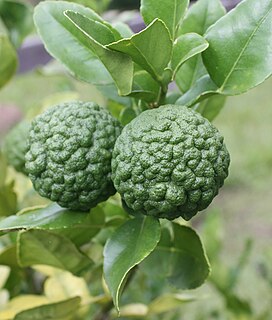
Citrus hystrix, called the kaffir lime or makrut lime, is a citrus fruit native to tropical Southeast Asia and southern China.
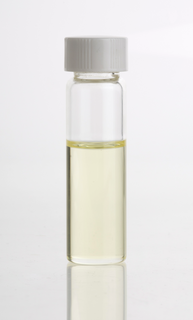
An essential oil is a concentrated hydrophobic liquid containing volatile chemical compounds from plants. Essential oils are also known as volatile oils, ethereal oils, aetheroleum, or simply as the oil of the plant from which they were extracted, such as oil of clove. An essential oil is "essential" in the sense that it contains the "essence of" the plant's fragrance—the characteristic fragrance of the plant from which it is derived. The term "essential" used here does not mean indispensable or usable by the human body, as with the terms essential amino acid or essential fatty acid, which are so called because they are nutritionally required by a living organism.

The citron is a large fragrant citrus fruit with a thick rind. It is one of the original citrus fruits from which all other citrus types developed through natural hybrid speciation or artificial hybridization. Though citron cultivars take on a wide variety of physical forms, they are all closely related genetically. It is used in Asian cuisine, traditional medicines, perfume, and religious rituals and offerings. Hybrids of citrons with other citrus are commercially more prominent, notably lemons and many limes.
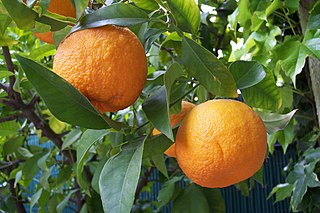
Bitter orange, Seville orange, sour orange, bigarade orange, or marmalade orange is the citrus tree Citrus × aurantium and its fruit. It is native to Southeast Asia and has been spread by humans to many parts of the world. It is probably a cross between the pomelo, Citrus maxima, and the mandarin orange, Citrus reticulata.

Steam distillation is a separation process that consists in distilling water together with other volatile and non-volatile components. The steam from the boiling water carries the vapor of the volatiles to a condenser; both are cooled and return to the liquid or solid state, while the non-volatile residues remain behind in the boiling container.
Limoncello is an Italian lemon liqueur mainly produced in Southern Italy, especially in the region around the Sorrentine Peninsula and the coast of Amalfi. In northern Italy, the liqueur is often referred to instead as limoncino. It is the second most popular liqueur in Italy and is traditionally served chilled as an after-dinner digestivo. It is also a popular homemade liqueur, with various recipes available online and in print.
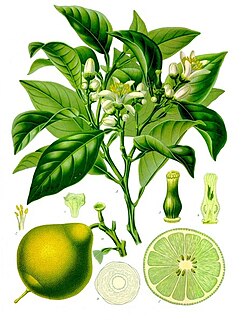
Citrus bergamia, the bergamot orange, is a fragrant citrus fruit the size of an orange, with a yellow or green color similar to a lime, depending on ripeness.
Curaçao is a liqueur flavored with the dried peel of the bitter orange laraha, a citrus fruit, grown on the Dutch island of Curaçao.

Limonene is a colorless liquid aliphatic hydrocarbon classified as a cyclic monoterpene, and is the major component in the oil of citrus fruit peels. The D-isomer, occurring more commonly in nature as the fragrance of oranges, is a flavoring agent in food manufacturing. It is also used in chemical synthesis as a precursor to carvone and as a renewables-based solvent in cleaning products. The less common L-isomer has a piny, turpentine-like odor, and is found in the edible parts of such plants as caraway, dill, and bergamot orange plants.
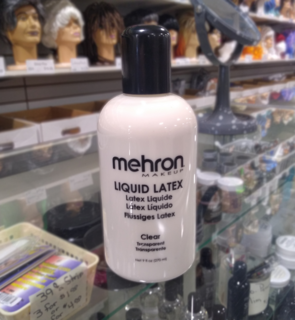
Liquid latex is a compound often used for special effects makeup, body painting, mask making, and casting applications.
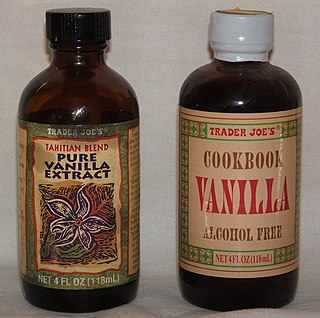
An extract is a substance made by extracting a part of a raw material, often by using a solvent such as ethanol, oil or water. Extracts may be sold as tinctures, absolutes or in powder form.

Infusion is the process of extracting chemical compounds or flavors from plant material in a solvent such as water, oil or alcohol, by allowing the material to remain suspended in the solvent over time. An infusion is also the name for the resultant liquid. The process of infusion is distinct from both decoction—a method of extraction involving boiling the plant material—and percolation, in which water is passed through the material.

Fragrance extraction refers to the separation process of aromatic compounds from raw materials, using methods such as distillation, solvent extraction, expression, sieving, or enfleurage. The results of the extracts are either essential oils, absolutes, concretes, or butters, depending on the amount of waxes in the extracted product.

Galatro is a comune (municipality) in the Province of Reggio Calabria in the Italian region Calabria, located about 60 kilometres (37 mi) southwest of Catanzaro and about 60 kilometres (37 mi) northeast of Reggio Calabria. As of 31 December 2004 it had a population of 2,077 and an area of 50.5 square kilometres (19.5 sq mi).
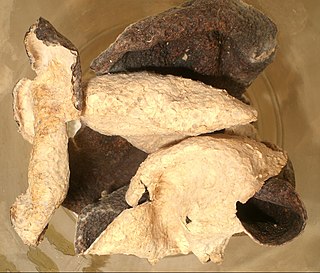
Chenpi, chen pi, or chimpi is sun-dried mandarin orange peel used as a traditional seasoning in Chinese cooking and traditional medicine. It is aged by storing them dry. The taste is first slightly sweet, but the aftertaste is pungent and bitter. According to Chinese herbology, its attribute is warm. Chenpi has a common name, ‘ju pi’ or mandarin orange peel.

The juice vesicles, also known as citrus kernels, of a citrus fruit are the membranous content of the fruit's endocarp. All fruits from the Citranae subtribe, subfamily Aurantioideae, and family Rutaceae have juice vesicles. The vesicles contain the juice of the fruit and appear shiny and baglike. Vesicles come in two shapes: the superior and inferior, and these are distinct. Citrus fruit with more vesicles generally weighs more than those with fewer vesicles. Fruits with many segments, such as the grapefruit or pomelo, have more vesicles per segment than fruits with fewer segments, such as the kumquat and mandarin. Each vesicle in a segment in citrus fruits has approximately the same shape, size, and weight. About 5% of the weight of an average orange is made up of the membranes of the juice vesicles.
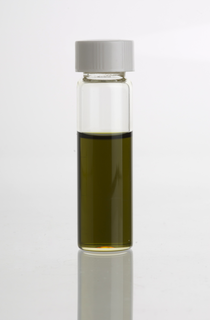
Bergamot essential oil is a cold-pressed essential oil produced by cells inside the rind of a bergamot orange fruit. It is a common flavoring and top note in perfumes. The scent of bergamot essential oil is similar to a sweet light orange peel oil with a floral note.
References
- Giovanni Dugo; Angelo Di Giacomo, eds. (2002). Citrus. London: Taylor & Francis. ISBN 0-415-28491-0.
- Angela Di Giacomo. "Development of the citrus industry: historical note". pp. 63–70.
- Angela Di Giacomo and Giovanni Di Giacomo. "Essential oil production". pp. 114–147.